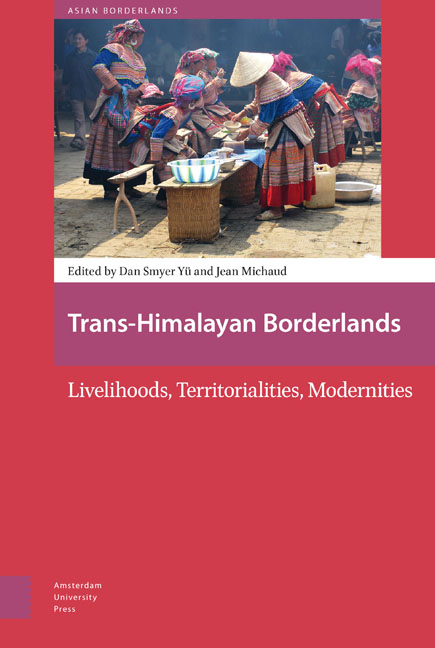Book contents
- Frontmatter
- Contents
- Acknowledgements
- Introduction: Trans-Himalayas as Multistate Margins
- I Territory, Worldviews, and Power Through Time
- 1 Adjusting Livelihood Structure in the Southeast Asian Massif
- 2 The Properties of Territory in Nepal’s State of Transformation
- 3 Trans-Himalayan Buddhist Secularities: Sino-Indian Geopolitics of Territoriality in Indo-Tibetan Interface
- 4 Buddhist Books on Trans-Himalayan Pathways: Materials and Technologies Connecting People and Ecological Environments in a Transnational Landscape
- 5 Seeking China's Back Door: On English Handkerchiefs and Global Local Markets in the Early Nineteenth Century
- II Livelihood Reconstructions, Flows, and Trans-Himalayan Modernities
- 6 Contested Modernities: Place, Subjectivity, and Himalayan Dam Infrastructures
- 7 Plurality and Plasticity of Everyday Humanitarianism in the Karen Conflict
- 8 Being Modern: Livelihood Reconstruction among Land-lost Peasants in Chenggong (Kunming)
- 9 Tibetan Wine Production, Taste of Place, and Regional Niche Identities in Shangri-La, China
- 10 Tea and Merit: Landscape Making in the Ritual Lives of the De’ang People in Western Yunnan
- 11 In-between Poppy and Rubber Fields: Experimenting a Transborder Livelihood among the Akha in the Northwestern Frontier of Laos
- 12 A Fortuitous Frontier Opportunity: Cardamom Livelihoods in the Sino-Vietnamese Borderlands
- Conclusion: Frictions in Trans-Himalayan Studies
- Index
9 - Tibetan Wine Production, Taste of Place, and Regional Niche Identities in Shangri-La, China
Published online by Cambridge University Press: 12 December 2020
- Frontmatter
- Contents
- Acknowledgements
- Introduction: Trans-Himalayas as Multistate Margins
- I Territory, Worldviews, and Power Through Time
- 1 Adjusting Livelihood Structure in the Southeast Asian Massif
- 2 The Properties of Territory in Nepal’s State of Transformation
- 3 Trans-Himalayan Buddhist Secularities: Sino-Indian Geopolitics of Territoriality in Indo-Tibetan Interface
- 4 Buddhist Books on Trans-Himalayan Pathways: Materials and Technologies Connecting People and Ecological Environments in a Transnational Landscape
- 5 Seeking China's Back Door: On English Handkerchiefs and Global Local Markets in the Early Nineteenth Century
- II Livelihood Reconstructions, Flows, and Trans-Himalayan Modernities
- 6 Contested Modernities: Place, Subjectivity, and Himalayan Dam Infrastructures
- 7 Plurality and Plasticity of Everyday Humanitarianism in the Karen Conflict
- 8 Being Modern: Livelihood Reconstruction among Land-lost Peasants in Chenggong (Kunming)
- 9 Tibetan Wine Production, Taste of Place, and Regional Niche Identities in Shangri-La, China
- 10 Tea and Merit: Landscape Making in the Ritual Lives of the De’ang People in Western Yunnan
- 11 In-between Poppy and Rubber Fields: Experimenting a Transborder Livelihood among the Akha in the Northwestern Frontier of Laos
- 12 A Fortuitous Frontier Opportunity: Cardamom Livelihoods in the Sino-Vietnamese Borderlands
- Conclusion: Frictions in Trans-Himalayan Studies
- Index
Summary
Abstract
This chapter explores Tibetan wine production in Yunnan Province, where areas have been transformed into vineyards for state-promoted ‘Shangri-La Wine,’ marketed using Tibetan culture and landscapes. This marketing is also based upon a history of Catholic missionaries who first introduced grapes and wine into the area during the late nineteenth and early twentieth centuries. In the chapter I focus on a Tibetan Catholic community, examining how state promotion of tourism and wine has led to the engagement by villagers with their Catholic history through the production of wine and to the transformation of the village landscape into one defined by vineyards. Historical transregionality of Catholic Tibetan winemaking with France and Switzerland, and contemporarily with the larger Chinese and global economy is also emphasized.
Keywords: Tibetan people, landscape, wine, terroir, identity, Catholic
Introduction
Traveling through rugged Deqin County in China's northwest Yunnan Province today, the landscape is quite distinctive, the Lancang River (Dzachu in Tibetan, upper reaches of the Mekong) and Jinsha River (Drichu in Tibetan, upper reaches of the Yangtze) flow through deep, dry, and arid canyons flanked by forest-covered mountains and high, snow-capped peaks. Along the banks of these rivers and their tributaries are scattered Tibetan villages, today identifiable by a common yet surprising sight – vineyards. In 2011, while researching the economic impacts of hydropower resettlement in the region, through daily ethnographic engagement with villagers I then began to understand just how important these vineyards have become to livelihoods and daily agricultural life (Galipeau 2014, 2015). Based upon these initial findings, I embarked upon a much larger ethnographic exploration into the history and overall project surrounding this village agricultural industry. I found it was based upon a long if yet small Catholic history in a few villages, combined with recent state-based schemes to simultaneously improve local livelihoods and further promote commodities produced within, and the development of the landscape of ‘Shangri-La.’ By Shangri-La, in this chapter I am referring to both a recently incorporated administrative unit of Yunnan Province and an imagined space for commercial use.
This chapter illustrates the story of household wines produced in northwest Yunnan's Deqin County, and how they have worked to produce distinctive and unique regional economic identities among Tibetan villagers.
- Type
- Chapter
- Information
- Trans-Himalayan BorderlandsLivelihoods, Territorialities, Modernities, pp. 207 - 228Publisher: Amsterdam University PressPrint publication year: 2017



